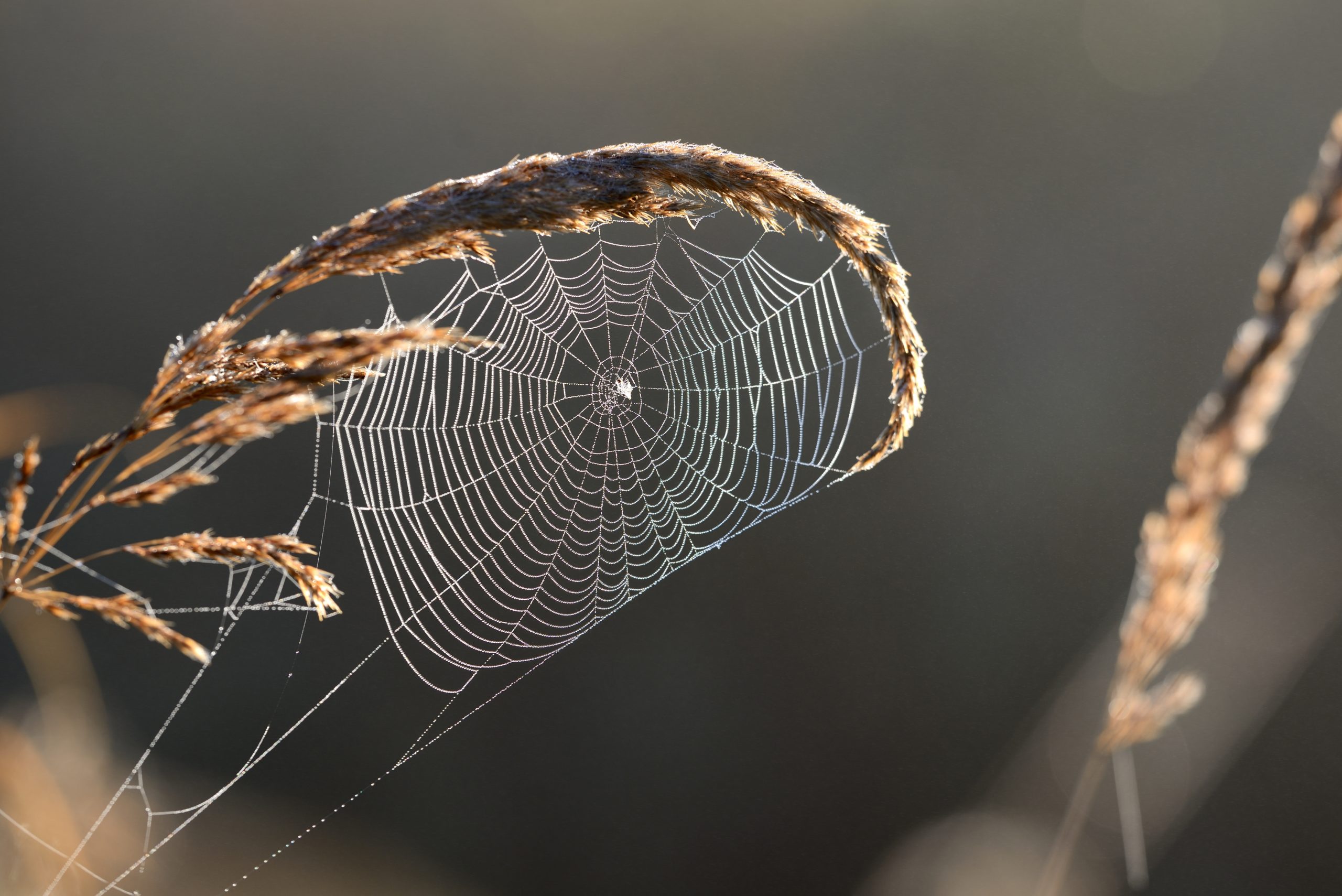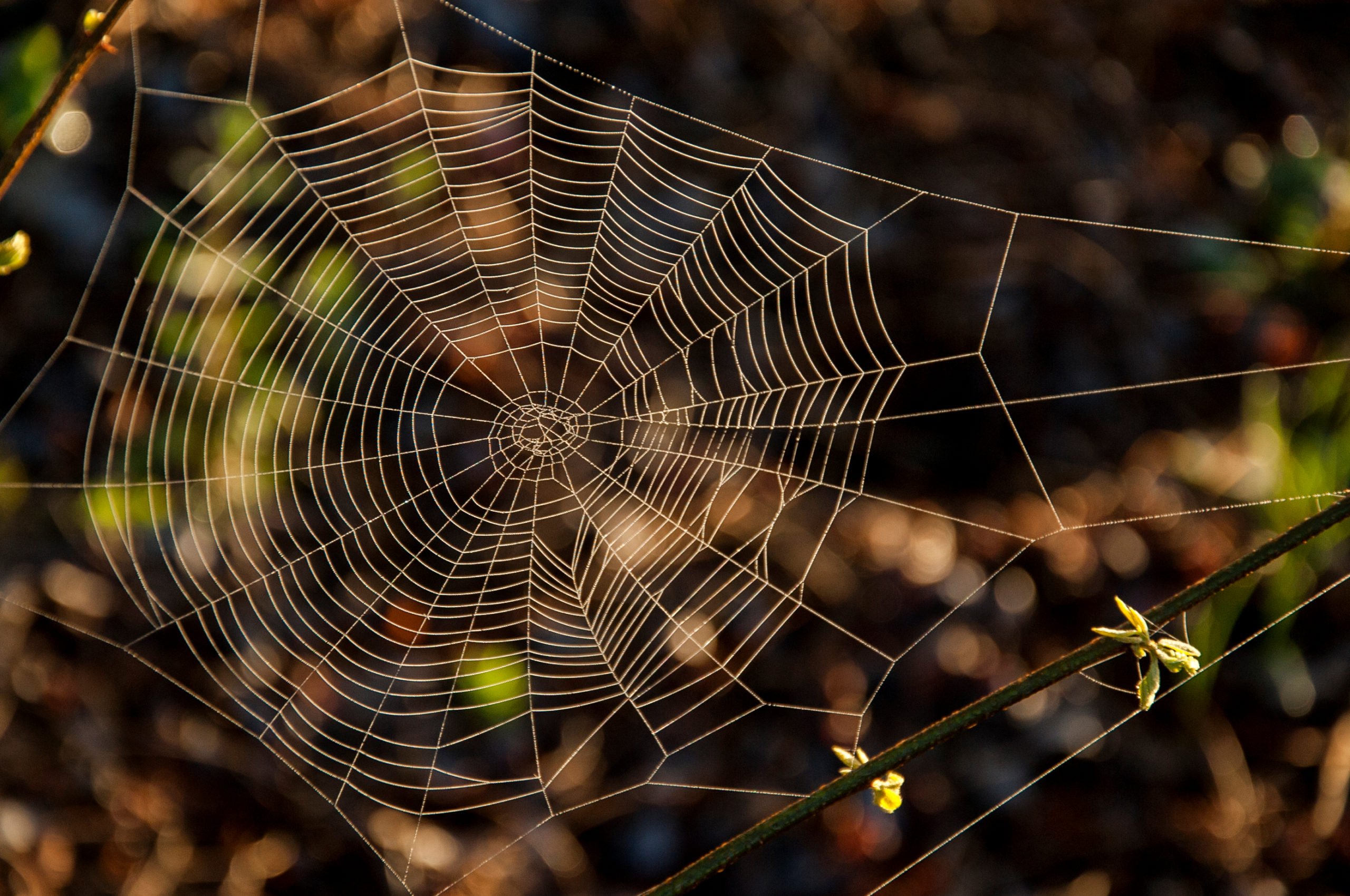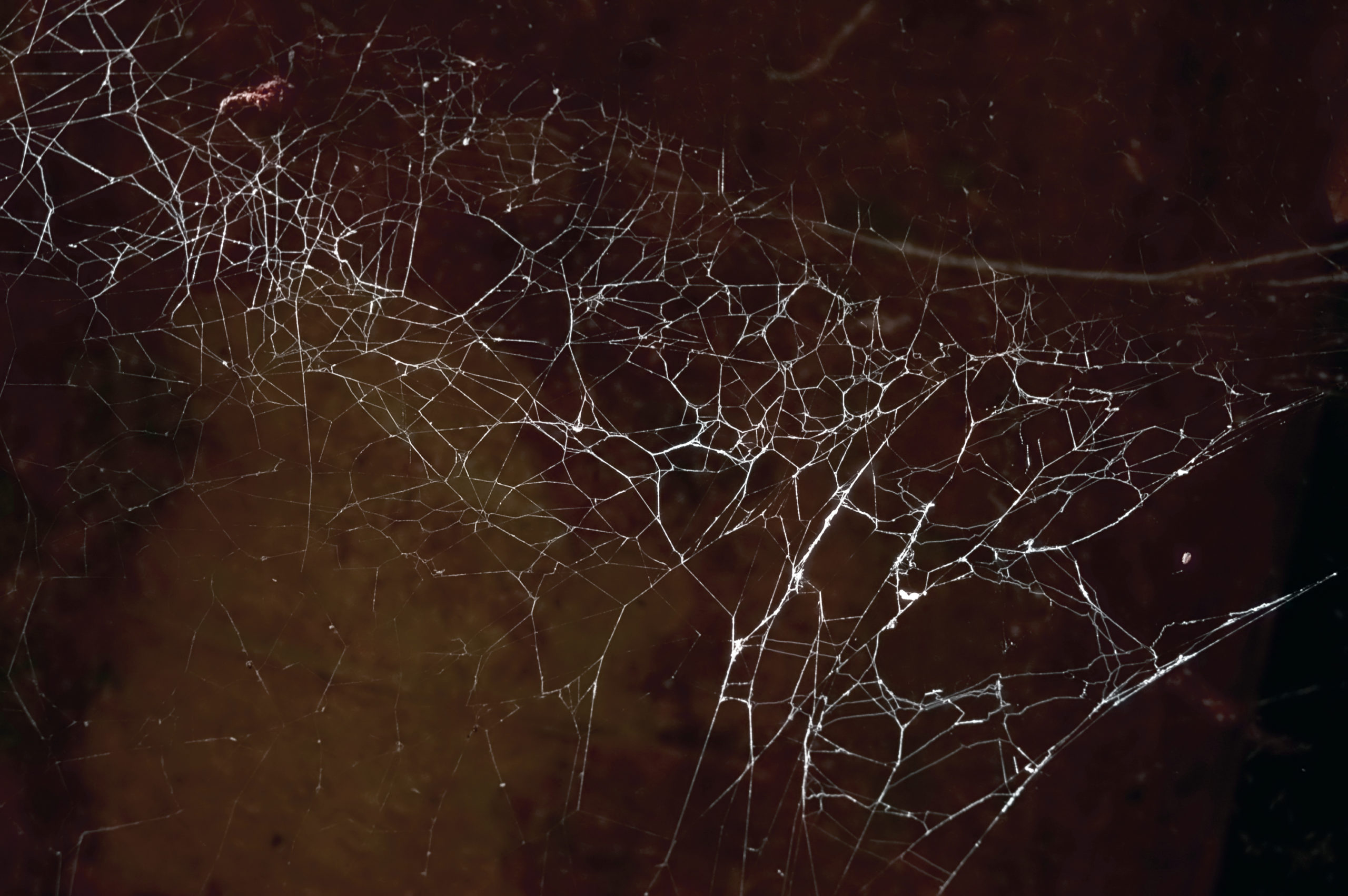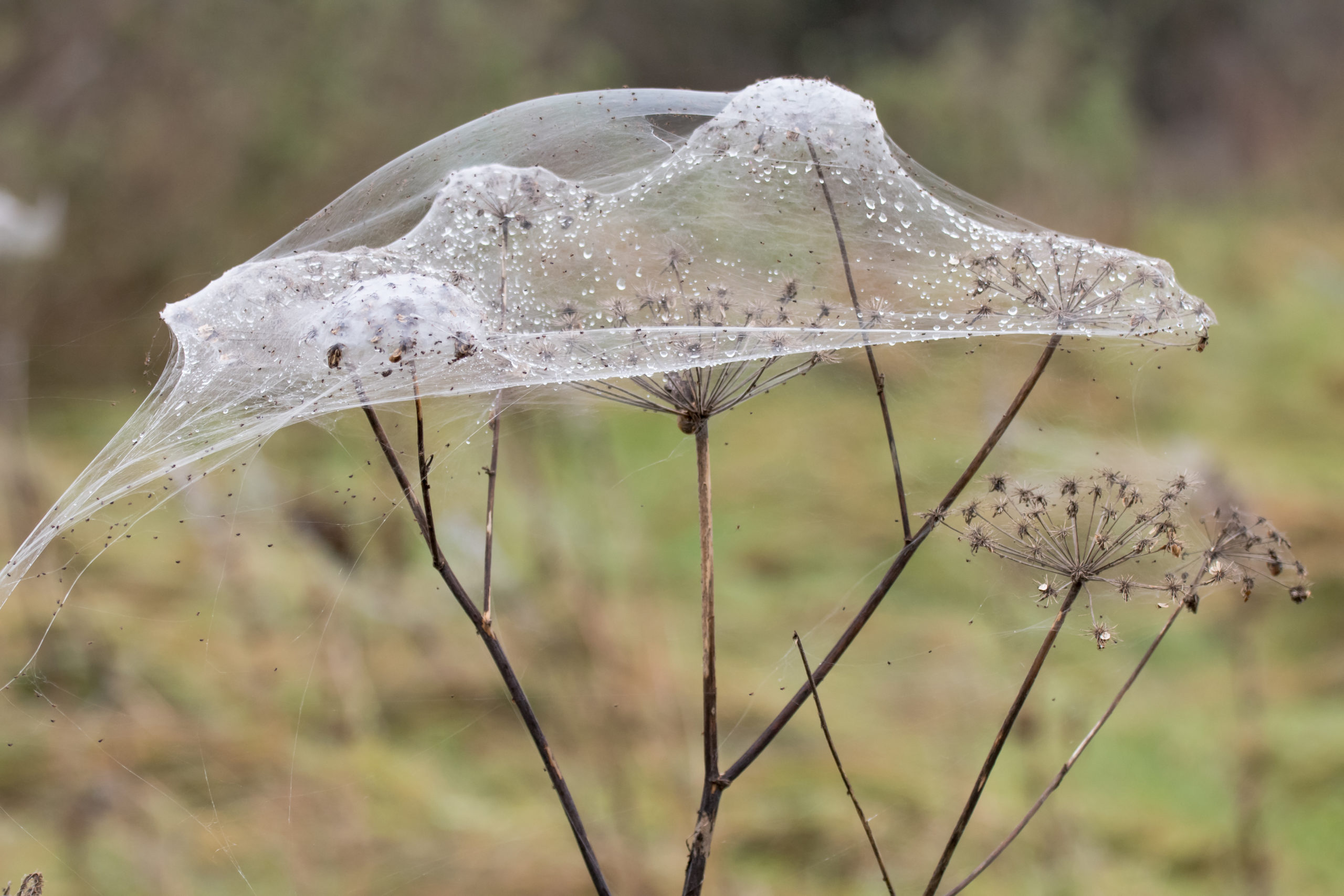Different Kinds of Spider Webs
Different Kinds of Spider Webs
Spider Silk – An Impressive Material
Spider silk is an incredible material. It is lighter than cotton and thinner than human hair, yet simultaneously, miraculously strong and durable. The silk is produced within a set of special glands in spiders and is comprised of a series of proteins known as spidroins. Amazingly, different kinds of silk can even be produced by the same spider using different silk-making glands. This is what causes the variance that you may see in spider webs regarding the strength and elasticity of strands. For example, in typical webs the primary lines stretching from the center of a web outward are made up of a silk called major-ampullate or dragline. The inside strands of the web are made of a far stickier and more elastic kind of silk called flagelliform, which are held to the draglines using disks of a third silk: piriform silk.
Spiders have evolved to use their webbing in a variety of ways, from the vast number of different kinds of webs, to intricate nests, mating rituals, and more. Sometimes you can even identify what spider is lurking around just by examining their webs. Different species of spiders produce different kinds of webs, the most common of which are: orb webs, funnel webs, tangled webs, and sheet webs.

Orb Webs
These are the most common kinds of webs and what most people think of when picturing a spider web. Due to their strategic design, these webs are also some of the most efficient at capturing prey.
Description – Orb webs have an overall circular design with elastic, silken spokes stretching outward from a center point and spirals connecting the spokes.
Types of Spiders – These webs are created by spiders known as orb-weavers who belong to the family Araneidae. Most orb-weavers prefer to live outdoors and, due to the effective nature of these webs, can collect over 200 outdoor insects in a single day.

Funnel Webs
The spiders that construct these webs use the unique design to hide, ambushing their prey when they sense the vibrations on their web, revealing the location of the unsuspecting insect.
Description – As its name suggests, these webs are formed in the shape of a funnel with a cylindrical hole in the center and sheet-like webbing stretching outward to form the base.
Types of Spiders – Just like orb-weaver spiders, the spiders that inhabit these webs are called funnel-weavers – not to be confused with the incredibly dangerous funnel-web spiders. Funnel-weaver spiders are part of the Agelenidae family and are known for their size and menacing appearance.
Tangled Webs
Also often referred to as cobwebs, these webs look much like their name suggests, a tangle. These webs are commonly found indoors and are constructed high up in low traffic areas.
Description – These webs are a messy tangle of sticky spindles, which leads to them easily collecting dust and other airborne debris. This gives tangle webs a very dirty appearance
Types of Spiders – The most common species to create these webs in homes are house spiders and other arachnids in the Theridiidae family.

Sheet Webs
These webs are constructed outdoors often on foliage such a bushes or grass. They are continuously damaged due to being outdoors, but they are also incredibly resilient webs that last longer than most other types of webs ever can.
Description – These webs are constructed horizontally and often resemble messy little hammocks or domes depending on whether the web stretches over plants or dips between them.
Types of Spiders – The second largest family of spiders, the Linphiidae, are the spiders responsible for creating sheet webs. Most Linphiidae species are completely harmless to humans although they can be very annoying and disruptive by creating so many webs on and around homes.

Other Kinds of Webs
In addition to these four primary kinds of webs, webbing can be used in a number of other forms including:
- Mesh Webs
- Molting Mat
- Triangle Webs
- Sperm Webbing
- Egg Sacs
An Annoyance at Home
As amazing as spider webs might be when considered on a scientific level, they’re nothing more than a massive annoyance when they’re in and around our homes. To get rid of webbing, and the pesky little creepy crawlies that make it, just make one quick call to us at Green Pest Services. We are experts at spider extermination and control!
Citations
Bittel, J. (2021) Spiderwebs and Spider Silk, explained, Animals. National Geographic. Available at: https://www.nationalgeographic.com/animals/article/spiderwebs-explained (Accessed: December 30, 2021).
David, Z. (2021) 9 types of spider webs: Identification + Pictures & Spiders, Beyond The Treat. Available at: https://beyondthetreat.com/types-of-spider-webs/ (Accessed: December 30, 2021).
Spider webs: Not just for Halloween (no date) Natural History Museum. Available at: https://www.nhm.ac.uk/discover/spider-webs.html (Accessed: December 30, 2021).
Wood-Black, F. (2018) The Steel Strength of Featherweight Spider Silk, inChemistry. Available at: https://inchemistry.acs.org/atomic-news/spider-webs.html (Accessed: March 22, 2021).
The Clear Signs of Bed Bugs in Every Setting
The Clear Signs of Bed Bugs in Every Setting The Clear Signs of Bed Bugs in Every Setting Summary: A setting-by-setting guide to [...]
Odor is an Early Sign of Rodents, Here’s Why
Odor is an Early Sign of Rodents, Here’s Why Odor is an Early Sign of Rodents, Here’s Why Summary: Rodent odors are often [...]
Pest Prevention Tips for Snowy Days
Pest Prevention Tips for Snowy Days Pest Prevention Tips for Snowy Days Summary: Snowy weather pushes pests to seek warmth and shelter indoors, [...]
How Do Ants Spend Winter? What Homeowners Should Know About Ants in Winter
How Do Ants Spend Winter? What Homeowners Should Know About Ants in Winter How Do Ants Spend Winter? What Homeowners Should Know About Ants in [...]
Termites Are Awful Winter Pests – Here’s Why
Termites Are Awful Winter Pests – Here’s Why Termites Are Awful Winter Pests – Here’s Why Summary: Termites can remain active through winter [...]
How to Maintain a Pest-Free Kitchen for the Holidays
How to Maintain a Pest-Free Kitchen for the Holidays How to Maintain a Pest-Free Kitchen for the Holidays Summary: This blog educates homeowners [...]

